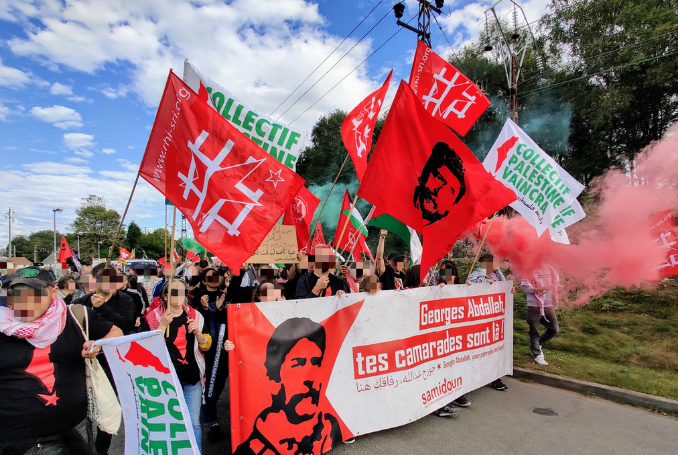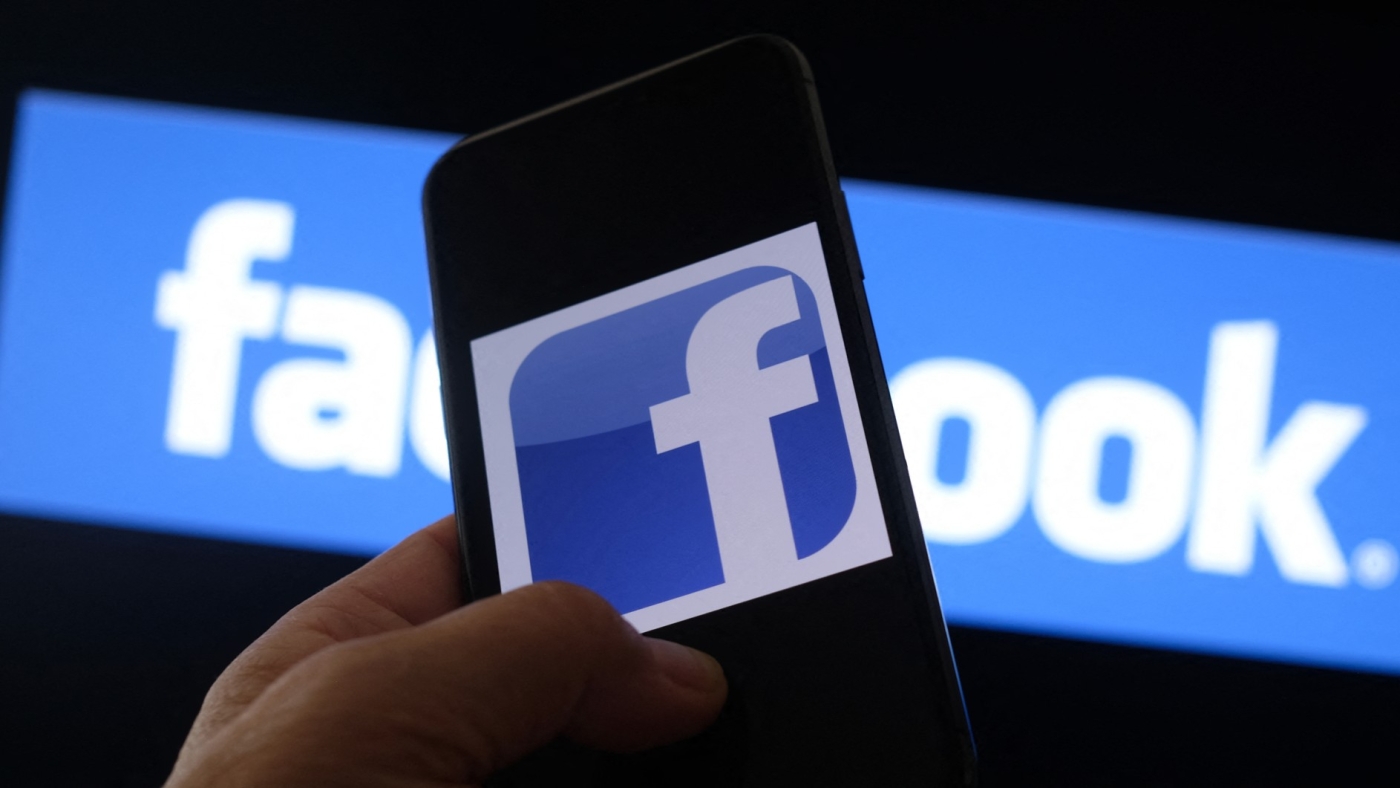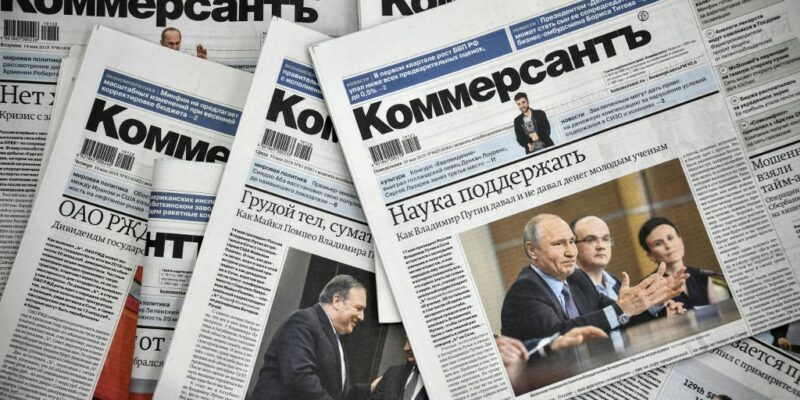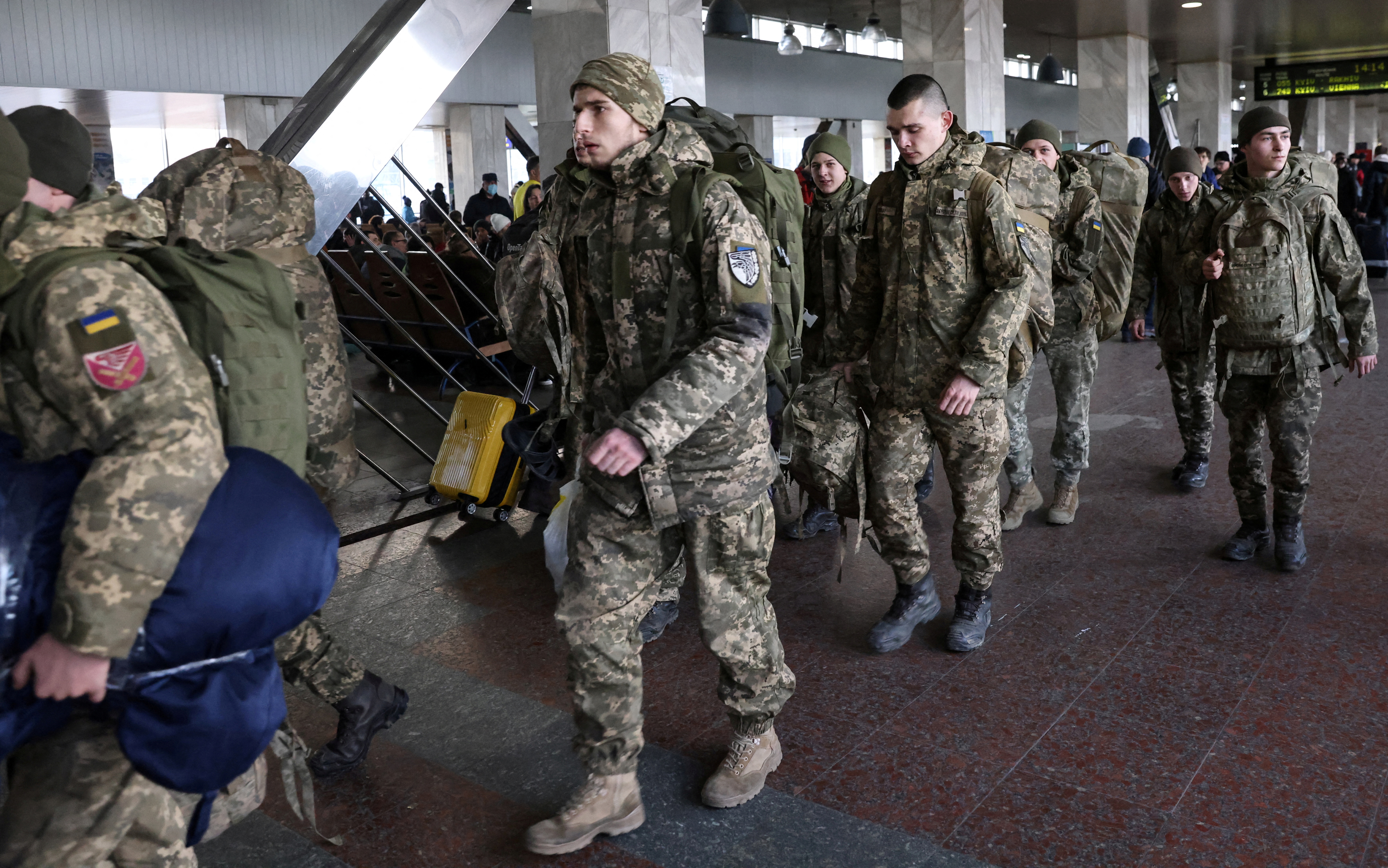As officials in Moscow threaten to replace the democratically elected Ukrainian government and Russian forces appear set to overpower Ukrainian defenses, is this the end of an independent Ukraine? We speak with Ukrainian peace activist Nina Potarska, who fled the country after Russian troops entered Ukraine on Thursday, even as her 11-year-old daughter with COVID-19 had to stay behind. She is participating in CodePink’s international emergency online rally on Saturday to advocate against war and against NATO membership for Ukraine. “I feel that my country now is like a battlefield for all other countries’ ambition,” says Potarska. “We want to be in peace.”
A Brief Colonial History Of Ceylon(SriLanka)
Sri Lanka: One Island Two Nations
A Brief Colonial History Of Ceylon(SriLanka)
Sri Lanka: One Island Two Nations
(Full Story)
Search This Blog
Back to 500BC.
==========================
Thiranjala Weerasinghe sj.- One Island Two Nations
?????????????????????????????????????????????????Monday, February 28, 2022
Israeli forces fatally shoot child, block ambulance

Muhammad Rizq Shehade Salah
Defence for Children International-PalestineTamara Nassar -24 February 2022
Israel fatally shot a Palestinian child on Tuesday and left him to bleed while preventing an ambulance from reaching him.
Muhammad Rizq Shehade Salah was about 100 meters from the Israeli-built separation barrier in al-Khader village south of Bethlehem in the occupied West Bank when an Israeli soldier shot him in the torso with live ammunition.
The Israeli army claimed he had been throwing a Molotov cocktail, according to Haaretz.
But the military statement actually quoted by the newspaper is much more vague. It says that Israeli soldiers “identified three suspects who arrived at a location where Molotov cocktails were repeatedly thrown at Israeli vehicles recently.”
No Israelis were reported injured in the alleged incident.
As the 13-year-old lay bleeding and injured on the ground, Israeli forces approached him and stripped him of his clothes, video footage shows.
The army prevented a Palestinian ambulance from reaching him, Defense for Children International-Palestine confirmed.
The bleeding and injured child was left on the ground for 30 minutes until Israeli forces put him on a stretcher and transferred him to Route 60, a highway used by Israeli settlers where Israeli gunfire has killed multiple Palestinians.
The boy’s father, Rizq Shehade Salah, arrived at Route 60 to inquire about his son’s condition. Two Israeli ambulances were on the scene.
But Israeli forces “threatened him with their firearms” and prevented him from approaching, according to DCIP.
The Israeli army then seized Muhammad’s body and held it overnight until they handed it over to his family on Wednesday.
Muhammad is the second Palestinian child Israel has killed this year.
DCIP notes that last year was the deadliest for Palestinian children since 2014.
On 13 February, an Israeli sniper shot Muhammad Akram Abu Salah in the eye, killing him, in Silat al-Harithiya village near Jenin.
He succumbed to his wounds in the early hours of the next day.
Abu Salah was killed while Israeli troops invaded the village to demolish the home of a Palestinian prisoner accused of involvement in the killing of an Israeli in December.
Such punitive home demolitions are a form of collective punishment – a war crime.
PODCAST: The Jewish comedian calling out apartheid in Arabic
From Tel Aviv to East Jerusalem and New York, Noam Shuster-Eliassi is using comedy to deliver home truths about injustice in Israel-Palestine.
Noam Shuster-Eliassi. (Noam Shuster-Eliassi)
Listen here: Apple Podcasts | Spotify | Google Podcasts
By Natasha Roth-Rowland February 25, 2022
Noam Shuster-Eliassi, an Israeli comedian based in south Tel Aviv, spent her childhood and early adulthood invested in a traditional model of coexistence between Israelis and Palestinians. Growing up in Neve Shalom-Wahat al-Salam, a mixed community in central Israel where Jews and Palestinians live together by choice, Shuster-Eliassi took to peace activism as a young adult, becoming part of dialogue groups and working with a UN subsidiary.
Yet she came to find this mode of activism inadequate, she told The +972 Podcast. “I got to a very extreme point where I couldn’t deal anymore with how much we were not making any progress in humanitarian work and in the NGO world.”
Turning to stand-up comedy, she said, not only helped her feel less alone in struggling against the situation in Israel-Palestine, but also helped the trilingual Shuster-Eliassi — she speaks Hebrew, Arabic, and English — express herself in the way that she wanted. “[Comedy] released my voice. It made me say the things that I dreamed of saying, it made me reach the people I’m dreaming of reaching — it made me speak in all the languages that I know.”
Even before harnessing comedy as a means of addressing the situation in Israel-Palestine head-on, however, Shuster-Eliassi experienced numerous political awakenings in her early life — from witnessing her father being jailed for refusing to serve in the Israeli army, to having painful reflections on and a frank discussion with her best friend, a Palestinian, about the prospect of her own military service.
“I grew up with Palestinians, they’re my neighbors, they’re my teachers, they’re my friends,” Shuster-Eliassi said. “Can I show up, after 18 years of living a shared life, with a uniform and an M16? When I truly asked myself this question, the answer became ‘no.’
These early experiences, as well as Shuster-Eliassi’s own identity as a left-wing Mizrahi woman, have propelled her comedy, bringing her to audiences across Israel-Palestine, the United States, and the U.K., as well as much of the Arabic-speaking world by way of viral skits that first appeared on Israeli television.
Yet despite the plaudits she has received for her commentary, she has faced no shortage of backlash — from nearly all sides.
“The world is not ready for a Jewish woman who uses her Arabic to criticize the situation [here],” Shuster-Eliassi said. “It takes time. We’re so separated and our languages are so separated.
“But I feel like I’m not doing something very new, because Jews always spoke Arabic. Jews — especially Mizrahi Jews — were always part of this part of the world. I’m just trying to bring it back to before we were separated from this identity.”
All of this is, Shuster-Eliassi says, in service of working toward a mode of activism and politics that transcends the limitations of traditional ideas of coexistence — and instead prioritizes shared struggle over abstract dialogue that invariably hits a dead-end.
“[The idea of] coexistence has a way of completely changing the focus from what we should be focusing on — which is fighting apartheid and fixing injustice, and talking about power relations.”
Corbyn calls for immediate unconditional recognition of Palestine
![Jeremy Corbyn MP addresses supporters of Julian Assange protesting outside the Royal Courts of Justice on the second day of the hearing on the United States government's appeal to the District Court’s decision to block the extradition of Julian Assange in London, United Kingdom on October 28, 2021 [Wiktor Szymanowicz / Anadolu Agency]](https://i0.wp.com/www.middleeastmonitor.com/wp-content/uploads/2021/10/20211028_2_50639124_70100202.jpg?resize=1200%2C800&quality=85&strip=all&zoom=1&ssl=1)
Jeremy Corbyn MP addresses supporters of Julian Assange protesting outside the Royal Courts of Justice on the second day of the hearing on the United States government's appeal to the District Court’s decision to block the extradition of Julian Assange in London, United Kingdom on October 28, 2021 [Wiktor Szymanowicz / Anadolu Agency]
February 26, 2022
Former head of the Labour Party Jeremy Corbyn has called for the immediate and unconditional recognition of the State of Palestine.
During a discussion in Parliament regarding the recognition of the State of Palestine on Thursday, Corbyn asserted: "We should support the immediate and unconditional recognition of the State of Palestine."
Corbyn also tweeted a video of his speech in Parliament in which he spoke about the abuses of the Israeli settlement policy.
He stated that the settlements built by the occupation have for years aimed to strip Palestinians of the homes in which they have lived for 70 or 80 years.
Corbyn noted that he has personally witnessed refugees suffering profoundly due to the Israeli policies displacing them from their homes.
He also talked about the occupation's attempts to evacuate the Sheikh Jarrah neighbourhood, and other areas in occupied Jerusalem, whose residents fled to Jerusalem after the 1948 Nakba.
EXPLAINER: Why does France Attack Palestine Solidarity Organizations?

France decided to ban to Palestine solidarity groups. (Photo: via Collectif Palestine Vaincra FB Page)
By Claude Zurbach-February 26, 2022
As a gift to the pro-Israeli lobby, the French government, through its Minister of the Interior Gérard Darmanin, has announced its intention to dissolve two Palestine solidarity organizations: the Collectif Palestine Vaincra and the Comité d’Action Palestine.
Long History of Harassment of the BDS Campaign
In line with the policies of most European Union countries, pressure groups and political authorities in France have never skimped on filing complaints and administrative bans. And this has been the case for more than 10 years, since the lawsuit brought against the BDS campaigners in Mulhouse, in the east of France. Since then, many collectives have been subjected to various forms of harassment, including those of Lyon, Toulouse, Bordeaux, Paris, Mulhouse, Colmar, Perpignan, and Montpellier (and the list is non-exhaustive).
The alleged arguments developed in this defamatory campaign invoke an alleged anti-Semitism, which constitutes the main angle of the Israeli attack against the international movement of solidarity with Palestine.
Throughout the years, these initiatives, aimed at suppressing any form of organized criticism of Israel, have been met with strong reactions, from a legal point of view, but also through grassroots mobilization and were almost always defeated in court.
But these repeated attacks are financially costly, can be morally exhausting, and require a lot of energy, which is then diverted into time-consuming and complex legal procedures.
Why Does France Attack Solidarity Organizations?
The reason behind these attacks is the solidarity, or deep connivance, between all the economic and political powers throughout the world and Israel. Tel Aviv is both the advanced point of Western domination in the Middle East and a laboratory for the sophisticated repressive and lethal tools (tested on the Palestinian population), which are sold to Western powers.
In this system of international domination, Israel has a place of choice, which explains the exceptional tolerance it enjoys while it has been multiplying its international law violations throughout occupied Palestine.
On the other hand, the proximity of the presidential campaign in France explains the timing of this decision. Most potential candidates have reaffirmed their unwavering support for the Zionist project, with the notable exception of candidates considered to be part of the ‘radical left’.
One right-wing candidate, Valérie Precress, even chose an outspoken Zionist as her advisor on international issues.
Winning overt or implicit support from the Israel lobbies is becoming an important element in France’s election campaign, all against a backdrop of the rising Islamophobia.
Israel is particularly worried about the discredit at an international level. In this context, Tel Aviv knows that any show of complicity with the apartheid regime imposed in Palestine is supposed to produce gains.
Reaction of the Solidarity Movement in France
The Association France-Palestine Solidarity, the main association of solidarity with Palestine, reacted with a first unambiguous statement, recalling that “solidarity is not a crime, it is a duty” and quite rightly that “support for the legitimate claims of the Palestinian people is in no way comparable to any call for hatred towards Israel or the Israelis, it is a call for justice and the application of international law”.
In addition to the two associations concerned by the decision, the Collectif Palestine Vaincra and the Comité d’Action Palestine, others such as the Union Juive Française pour la Paix and Europalestine have reacted quickly. A petition is online to show their refusal of the government’s liberticidal decisions.
It would be important for other organizations, focused on the defense of individual and collective rights, to come forward to protest against these iniquitous decisions. Indeed, any breach of solidarity will be a loophole that can be exploited by the supporters of apartheid in Palestine to impose further bans and dissolutions.
UK lawyers file complaint against Facebook over anti-Palestinian bias
Complaint calls for an urgent review by Facebook's parent company Meta, and an explanation for why Palestinian accounts were censored

Facebook has repeatedly been accused of censoring the experiences of Palestinians and their narrative (AFP/File photo)
By MEE staff- 22 February 2022
A London-based legal and justice centre has filed a formal complaint to Facebook, accusing the social media platform of arbitrarily censoring and suspending accounts affiliated with Palestinian news agencies, advocates and journalists.
The complaint, delivered by London law firm Bindmans LLP on behalf of the International Centre of Justice for Palestinians (ICJP) and digital rights group Sada Social, requests that the platform, which rebranded as Meta last October, issue an urgent review of its actions and explain why it censored those accounts.
"The complaint reinstates the request that Meta/Facebook discloses and reviews its decision-making process, and explains why the accounts were closed, suspended or posts taken down, and whether in doing so an algorithm or human discretion was used," the ICJP said in a press release on Tuesday.

'Facebook Censors Jerusalem': Campaign protests Meta's alleged censorship of Palestinian posts
Read More »The complaint was also sent to the United Nations special rapporteur on the promotion and protection of freedom of opinion and expression.
For years Meta has been accused of censoring the experiences of Palestinians and their narrative on both of its platforms - Facebook and Instagram.
The criticism hit a new high last May when Palestinian activists found that their posts on multiple social media platforms, including Facebook, Instagram and Twitter, were being deleted and their accounts suspended, often without explanation.
Since the start of 2021, Sada Social has documented more than 600 cases of Palestinian censorship on Facebook and Instagram. The non-profit says that journalists and media accounts were the targets of more than 200 of those cases.
Last June, nearly 200 Facebook employees signed an open letter accusing the company of unfairly taking down or down-ranking pro-Palestine content and demanded that new measures were put in place to prevent this in the future.
Palestinian digital rights
In September, Facebook's oversight board called for an independent review into alleged bias in the tech giant's moderation of Palestinian and Israeli posts, saying that content reviewers should not be "associated with either side of the Israeli-Palestinian conflict" and should examine both human and automated content moderation in Arabic and Hebrew.
One major concern among digital advocates is the degree to which Facebook is removing Palestinian content at the request of both the Israeli government, including the justice ministry's cyber unit, and a highly organised network of volunteers who report pro-Palestinian content.
The company responded that it had not received "a valid legal request" from a government authority in the case of one particular post that the board's report focused on. The company "declined to provide the remaining information requested by the board".
The ICPJ also shared concerns over the preliminary approval of a bill in Israel's Knesset. The proposed law would reportedly grant Israeli courts the power to demand the "removal of user-generated content on social media content platforms that can be perceived as inflammatory or as harming the security of the state or the security of the public".
The Palestinian Digital Rights Coalition (PDRC) and the Palestinian Human Rights Organisations Council (PHROC) have warned that the law would attract serious repercussions on Palestinian digital rights and pose a threat to the freedom of expression of Palestinians in the digital space.
Middle East Eye reached out to Meta for comment but did not receive a response by the time of publication.
Ukrainian Peace Activist: My Country Has Become a Battlefield for Major Powers. End the War Now
This is a rush transcript. Copy may not be in its final form.
AMY GOODMAN: This is Democracy Now!, The War and Peace Report. I’m Amy Goodman.
As we continue to look at the Russian invasion of Ukraine, we’re also joined by a Ukrainian peace activist who just fled the country earlier this week. Nina Potarska is the coordinator for the Women’s International League for Peace and Freedom in Ukraine. She’s set to speak Saturday as part of an international emergency online rally calling for “No War in Ukraine, No to NATO,” organized by the Campaign for Nuclear Disarmament, CodePink and others. She is joining us from Egypt.
Nina Potarska, welcome to Democracy Now! Please explain your circumstances. So, you have left Ukraine now, and your child is still in Ukraine?
NINA POTARSKA: Yes. I was able to fly on the last charter planes to Egypt, because there was not any other options. And my daughter was ill with COVID, so it was not possible to take her with me.
AMY GOODMAN: Your daughter has COVID?
NINA POTARSKA: Yes, in the same time.
AMY GOODMAN: How old is she?
NINA POTARSKA: Because, you know — she’s 11. And now, yesterday they left Kyiv, together with her father, and they were on the road near 30 hours. And now they are together with her father walking to Poland border, maybe eight kilometers, because of a lot of cars. And they want to join another part of my family, mother and wife of my brother. So, and the men —
AMY GOODMAN: Between the ages of 18 and 60 can’t?
NINA POTARSKA: Yeah, yeah, men are not allowed to go out, and they are all under the military duty. So, now, immediately now, they try to pass the border. And they’re really nervous because if it’s possible to go by alone to here because she’s 11. And so, it’s a big drama for every family now, because some are trying to escape from Kyiv, because in Kyiv now it’s really hard. Somebody try to reach Poland and spending many hours to get close to the border. And I am really grateful for our Polish friends and colleagues who are helping us in close to the border and helping with the cars, with food, with everything we need. So —
AMY GOODMAN: Nina, I want to thank you for being with us, because I know this is an incredibly difficult time for you. You are both dealing with all of this personally, as well as doing your political work. You’re going to participate with a CodePink online rally tomorrow. And it’s a rally that says “no to war” and as well as “no to NATO.” And I’m wondering if you can talk about your response to the Russian invasion and what you think needs to happen now.
NINA POTARSKA: Yeah. You know, in this conflict, I don’t want to take any party, because it’s like — it’s unbelievable, like it’s a bad movie, because I’m with this conflict from the very beginning, from 2014. And I know how to be in the shelling, under the shelling, from one side and from another side. And, you know, the people — the fear is the same. And it does not mean that which bombs is better, NATO bombs or Russian bombs. And we know that NATO also doing a lot of very terrible things but in other — in different parts of this war. But this time it’s maybe Russia time.
And, of course, now I feel that we are, like, alone, faced with this threat, because, in the one hand, Russia attacked us, and, in the other hand, the Western partners — and you are also our Western partners — like, refuse to do anything. And today we received information that we are like — there are no agreements because of — about [inaudible] shutdown. So, it was like a joke, really. It’s just one that everybody can suggest us. I feel that my country now is like a battlefield for all countries’ ambition: NATO parts and Russia parts. And two imperialistic countries want to divide my country.
And I just want to stress one very simple idea, that this is not movie. We are real people, and we die like real people. And real children cry because of the explosions everywhere. It’s not matter in Ukraine or in Afghanistan or in Syria: We all alive people, and we want to be in peace. And I beg you, stay human and not close the borders, not close this help for civilian population. And third, stop this nightmare for all this war and start this — so, stop this threat each other, because — and cut the stakes, because it’s time to get back a little bit to diplomatic mechanism.
And I really excuse because I am so angry, maybe because I’m so far and I feel that I need just to coordinate and be together with the media, too, because all my colleagues now in stress and help other people just to survive. And all my colleagues have no opportunity to speak aloud. And if our leaders really try to be human, because it’s not time to be strong and not time to be masculine, it’s not time to be so patriarchal, because we are going to hell everywhere. And if it’s really difficult to stay in this human level, ask us to help you, because we can sit together with you and just hold your hand to remind that where is the humanity, because it’s terrible what is going on in this world. I am in touch with a lot of women from all over the world and with women who have suffered from conflict around all of this world. It’s terrible. And I believe two years ago that COVID turned our mind to new reality when we have to care about each other, when strong country need help weak countries. But, no, now it’s like a stupid drama. I’m sorry.
AMY GOODMAN: Well, Nina Potarska, I want to thank you for being with us. All the best to your daughter, 11 years old, on the border with Poland right now with her father. Men can’t leave Ukraine. The Ukrainian government has called on all men 18 to 60 to stay in the country. Nina Potarska is the coordinator for the Women’s International League for Peace and Freedom in Ukraine, set to speak Saturday as part of the international emergency online rally calling for “no war in Ukraine” and “no to NATO,” that is organized by the Campaign for Nuclear Disarmament, CodePink and others. She was speaking to us from Sharm el-Sheikh in Egypt.
War in Ukraine: Russia steps up censorship

Picture credit: Alexander Nemenov / AFP.
On 26 February, the Russian media regulator Roskomnadzor (RKN) announced the opening of an administrative investigation against a number of Russian media outlets for allegedly “spreading false information of public interest”. The European Federation of Journalists (EFJ) joins the Russian Journalists’ and Media Workers’ Union (JMWU) in denouncing a new step in state censorship: RKN not only dictates to journalists what sources they can quote (only official Russian sources), but also what words they can use.
RKN criticises the targeted media for publishing “information about the shelling of Ukrainian cities and the death of civilians in Ukraine as a result of the actions of the Russian army”. RKN also criticised the journalists for using the terms “attack”, “invasion” or “war” to describe Russia’s armed aggression in Ukraine.
Among the media threatened with reprisals is the professional publication “Zhurnalist” for publishing a speech by Novaya Gazeta editor-in-chief and Nobel Peace Prize winner Dmitry Muratov, in which he calls the war a war (watch his video message below).
JMWU denounced the state censorship and “this Orwellian atmosphere of a Ministry of Truth”.
In addition, on Friday, Russian journalist Elena Chernenko, who is the head of Foreign desk at the “Kommersant” daily newspaper in Moscow, was excluded from the pool of journalists accredited to the Russian Foreign Ministry. The reason for this was her initiative to publish an open letter opposing the war, signed by more than 200 Russian journalists. The ministry excluded her on the grounds of so-called “unprofessionalism”.
“It is absolutely horrible that Russian journalists cannot work freely,’ said the EFJ President Mogens Blicher Bjerregård. “It clearly shows that truth is the first victim of a war. This is totally contrary to all the commitments signed in the Council of Europe. It is against all international agreements to support free and independent journalism.”
Russia faces major disruptions to oil, commodities flows without SWIFT

Ukrainian soldiers walk at Kyiv central train station, Ukraine, February 25, 2022. REUTERS/Umit Bektas
By Dmitry Zhdannikov-
LONDON, Feb 27 (Reuters) - Russian exports of all commodities from oil and metals to grains will be severely disrupted by fresh Western sanctions, dealing a blow to Russia's economy and hurting the West with a spike in prices and inflation, traders and analysts said.
The United States and its allies on Saturday moved to block certain Russian banks' access to the SWIFT international payment system in further punishment to Moscow as it continues its military assault against Ukraine. read more
While some Russian banks - including Gazprombank, which services large oil and gas payments - have escaped full blocking sanctions, traders and analysts said the time it takes to switch to new systems will still mean major upheavals to flows.
The measures, which will include restrictions on the Russian central bank's international reserves, will be implemented in the coming days, with officials saying some exemptions for energy were being worked out.
"While trying to exempt energy transactions, SWIFT can still cause significant disruption to energy trade flows in the near term, at least until buyers switch to alternatives like Telex or other systems," said Amrita Sen, co-founder of the Energy Aspects think-tank.
"On other commodities - I can’t see how trade continues without the exemptions," she said.
SWIFT, or the Society for Worldwide Interbank Financial Telecommunication, is a secure messaging system that facilitates rapid cross-border payments, transferring trillions of dollars a year in what has become the principal mechanism for financing international trade.
Russia produces 10% of global oil and supplies 40% of Europe's gas. It is the world's largest grains and fertilisers exporter, top palladium and nickel producer, third-largest exporter of coal and steel, and fifth-largest wood exporter.
The bid to exclude from the trading system whole chunks of the world's 11th largest economy - and supplier of one-sixth of all commodities - has no precedent in the globalised age.
It comes as the West is struggling with record high energy prices amid galloping inflation. read more
CLARITY SOUGHT
At least 10 oil and commodities traders, who spoke to Reuters on condition of anonymity, said flows of Russian commodities to the West will be severely disrupted or totally halted for days if not weeks until some clarity is established on exemptions.
"You can still use internal systems of international banks having branches in Russia, but it will be quite a mess," said a banker with a large Western bank with exposure to Russia, asking not to be named due to the sensitivity of the issue.
Some traders said while Russian banks that were still off the sanctions list, such as Surgutneftegasbank, could probably clear dollars, that did not necessarily solve the problem.
"Lots of companies will treat Russian oil as sanctioned and not touch it even if it is allowed," said a senior executive from a major Western oil trading desk, also asking not to be named due to the sensitivity of the matter.
"So it feels like maximum pain for the next two to three days while people work out what pathways are open," he added.
Russian energy and commodity flows to Asia, especially to China, will likely continue.
Both China and Russia have been developing alternatives to SWIFT. Beijing has been encouraging the use of its homegrown alternative, known as the CIPS clearing and settlement services system, while Moscow has set up its own banking messaging system, known as SPFS.
Russian officials have said the country can re-route its exports to China in case flows to the West are disrupted. But analysts have said gas cannot be re-routed at all, while Beijing's capacity to take more oil is limited.
The campaign against Russian conductor Valery Gergiev: Middle-class hysteria in the service of war
Following the launch of the Russian invasion of Ukraine, and after months of endless pro-war propaganda by Western governments and the corporate media, a chauvinist anti-Russian campaign is now underway in the US and Western Europe. Its targets include Russian musicians, conductors and singers.
Late Thursday, management at New York City’s Carnegie Hall announced that acclaimed Russian conductor Valery Gergiev would no longer be conducting the Vienna Philharmonic at the famed venue on Friday. Management also canceled a performance by respected pianist Denis Matsuev, who had been scheduled to perform Sergei Rachmaninoff’s Piano Concerto No.2.
Gergiev, 68, is among the most accomplished and respected figures in world classical music today, a field in which Russian and formerly Soviet artists have excelled. His international career began during the Cold War with a performance in Britain in 1985, at a time when the Reagan administration had ratcheted up tensions with the Soviet Union to the extreme. A quarter century ago, Gergiev was made principal guest conductor of New York’s Metropolitan Opera.
No reason was given for the removal of Gergiev from the program, but it was clearly carried out in retaliation for his support for Russian President Vladimir Putin, whom Gergiev met in St. Petersburg in the 1990s shortly after the dissolution of the USSR. Protests were evidently planned to take place in front of Carnegie Hall during the performance, prompting management to buckle to pressure. The New York Times, one of the chief clearinghouses for CIA propaganda, noted the cancellation with cynical satisfaction, labeling Gergiev not a musician but an agent of Russian soft-power politics, a “cultural ambassador” who has “built a busy international career while maintaining deep ties to the Russian state.”
Gergiev’s other international engagements are also threatened as well, and the continuation of his international career is being made subject to modern-day loyalty oaths. Milan’s La Scala opera house has threatened to drop a March 5 appearance if Gergiev does not publicly denounce Russia’s invasion of Ukraine. Munich’s mayor has given him three days to issue such a statement or face removal as chair of the Munich Philharmonic. Rotterdam is also reportedly considering canceling a Gergiev Festival scheduled for September.
There is staggering hypocrisy behind this campaign. It goes without saying that not a single figure in American music has ever faced any retribution for supporting the wars in Serbia, Afghanistan, Iraq, Syria, Libya … and the list goes on. The Times and the Democratic Party also make no attempt to reconcile their support for banning Russian musicians with their opposition to boycotts of Israeli intellectuals and academics for that country’s oppression of the Palestinians and recurring mass atrocities in the tiny Gaza Strip.
The claim is being made that Gergiev is being singled out not because he’s a Russian, but because of his backing for Putin. Should every US musician, artist or scientist who ever visited the White House, or served on an advisory panel on cultural or scientific affairs, have his or her career ended because of the American government’s vast crimes? Is every Hollywood celebrity who publicly endorsed Barack Obama responsible for his “Terror Tuesday” meetings where the president and other officials went over “kill lists” of potential drone strike targets?
Many other Russian classical performers now face similar threats, and the campaign has even expanded beyond individuals with any connection to Putin, to Russian music and culture in general. The Eurovision Song Contest has announced it will not accept entries this year from Russia, claiming the presence of musicians who happened to have been born in that country “would bring the competition to disrepute.” Various orchestras have even begun removing pieces by Pyotr Tchaikovsky and other Russian composers who died a century or more before the war in Ukraine began.
This disgusting spectacle is the product of war fever whipped up by the US government with the help of the pliant capitalist press, including the Times, the Washington Post and other pillars of what once passed for American liberalism.
This campaign to promote anti-Russian hatred has little popular support. It is largely centered in sections of the privileged middle class. Polls have consistently shown that the vast majority of the US public opposes war with Russia, or even significant American involvement in Ukraine, but one would have no sense of this by reading through the comments sections of the Times. The latter are dominated by furious statements blaming Putin for every conceivable social ill both foreign and domestic. Shamefully, hardly a single major academic, writer or intellectual can be found to oppose this.
This social layer has proven extremely vulnerable to this type of manipulation. For years, the affluent petty bourgeoisie has been in the grip of one witch-hunting campaign after another, which have destroyed innumerable careers on the basis of allegations and innuendo. This includes the #MeToo attacks on opera singer Placido Domingo and Metropolitan Opera director James Levine.
Dominating these campaigns are appeals to emotion, attacks on due process, the denigration and falsification of history and a worldview dominated by race and ethnicity, which have led to a shocking deadening of democratic consciousness within this milieu. But this outlook also reflects the class interests of this social stratum, which long ago made its peace with world imperialism.
Such people write and speak as though they lived the past three decades in a parallel universe in which the “Global War on Terror” and numerous “wars of choice” by American imperialism, all of them based on a torrent of lies and misinformation, never took place.
The attack on Gergiev and other artists—and this is only the start—has disturbing historical parallels. Some of the worst political crimes in 20th century US history were preceded by the creation of this type of frenzied jingoistic atmosphere. Vicious attacks on German immigrants occurred during World War I, including the murder of socialist coal miner Robert Prager in Collinsville, Illinois in April 1918. World War II witnessed the infamous mass internment of Japanese Americans by the Roosevelt administration.
These chauvinist campaigns also created the conditions for a wide-ranging assault on socialist opponents of war, including the arrest of Eugene Debs in 1918 and the leadership of the Socialist Workers Party in 1941.
There are currently 2.4 million Russian-Americans living in the US, including nearly 400,000 born in Russia or the former Soviet Union. Are they to be treated as well as potential enemy agents, organized and directed by Putin through RT and other Russian media outlets? Will they also be forced to publicly denounce the Russian government and its actions as a condition for keeping their jobs? Indeed, on Thursday Democratic congressman Eric Swalwell floated the possibility of expelling Russian international students from the United States as a form of collective punishment for the actions of the Kremlin.
There is a disturbing similarity between the campaign against Gergiev and the attack during World War I on Karl Muck, the German-born director of the Boston Symphony Orchestra. Muck was forced out of his position, arrested at night and interned for 17 months as an “enemy alien” after a press campaign over his supposed “refusal” to perform the Star Spangled Banner before concerts.
In response, Muck pointed to the universality of music and rejected its subordination to nationalism, declaring, “Art is a thing by itself, and not related to any particular nation or group. Therefore, it would be a gross mistake, a violation of artistic taste and principles for such an organization as ours to play patriotic airs. Does the public think that the Symphony Orchestra is a military band or a ballroom orchestra?”
The campaign against Russian musicians is aimed at poisoning public consciousness and depriving people of the sensitivity and human solidarity that great music always encourages.
The exchange of musicians between the US and the Soviet Union played a role in alleviating tensions, and inculcating mutual respect for the cultural achievements of both countries, largely limiting the spread of the most visceral forms of anti-Russian hatred to the extreme right. This history includes tours by great Soviet musicians in the US and the renowned international tours by American jazz musicians. In 1958, Texas-born Van Cliburn made an enormous impact on the Soviet public when he won the International Tchaikovsky Competition in Moscow.
Within the working class, a different attitude prevails. Decades of US invasions and wars, whose victims include American working class youth, have produced a deeply ingrained skepticism about Washington’s claims to be fighting for “national sovereignty” and “human rights.” Workers have learned through bitter experiences that behind such rhetoric lie the interests of the ruling elite. And they know, as always, it will be the workers of the world who will be made to pay the price.
The greatest danger, however, is that this latent opposition remains diffuse, unorganized and politically inarticulate. If the drive towards World War III is to be stopped, the working class must mobilize on a socialist, internationalist basis to stop it.
Subscribe to:
Posts (Atom)








